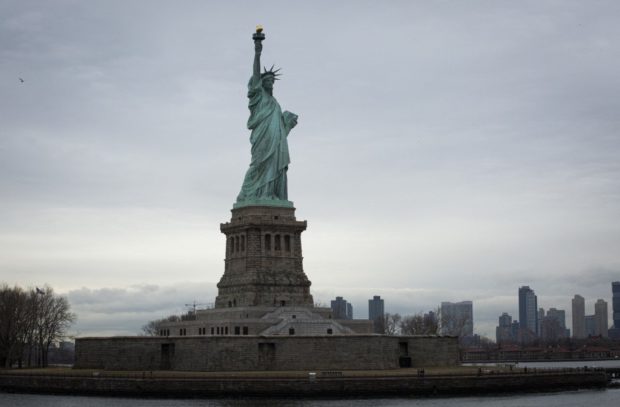
General View of Statue of Liberty in New York City on March 01, 2021. A year after the beginning of the pandemic, tourists, especially foreigners, have yet to return to New York; in the meantime, many New Yorkers are taking the opportunity to discover, or rediscover, the city’s emblematic places, which they have been avoiding until now. Photo by Kena Betancur / AFP
NEW YORK — New Yorkers are taking advantage of the absence of tourists during the pandemic to visit iconic sites in the Big Apple that they would normally avoid.
At 10:00 am (1500 GMT) on a recent Friday, barely ten people were on Liberty Island’s roughly 200-meter (650-ft) promenade, staring up at the Statue of Liberty.
In normal times, even although it is not peak season, hundreds of tourists would be posing for selfies in front of the copper icon of freedom.
Alexander Lumbres, a student at City University of New York, has been to the island 20 times before, but never been able to enjoy a crowd-free view of the statue.
“It was really hard for me to take pictures. Usually, we would go around the backside, just to get like a proper picture with the family and everything,” he said.
Roughly 67 million tourists visited New York City in 2019. In 2020, visitor numbers were a third of that, and most came before the pandemic began ravaging the city in the spring.
Today, 90 percent of visitors to the Metropolitan Museum of Art come from the local area, according to a spokesperson. Ordinarily, locals make up fewer than half.
NYC & Company, which markets the Big Apple around the world and which cut its workforce by almost a half because of coronavirus, launched the “All in NYC” campaign to encourage New Yorkers to visit their own city.
Getting New York back on its feet is “going to start with New Yorkers” said executive vice president Christopher Heywood.
“When you live here, you take it for granted,” said Darlene Vann, who’s in the military and stationed in New York for a year. She was visiting the Statue of Liberty for the first time.
Jerry Willis, of the National Park Service, the government agency that manages national parks and sites, said “New Yorkers are famous” for not visiting renowned sites on their doorstep.
Darlene’s husband, Jay Vann, prefers outdoor venues over closed spaces because officials are “limiting capacity” at indoor venues, which also come with the threat of some patrons not complying with strict health protocols.
In the fourth quarter of 2020, the Empire State Building observation deck recorded a 94 percent drop in visitors compared to the same period the year before, despite being open for the full three months.
At the 9/11 Memorial, only a few dozen people tend to walk amid the former home of the World Trade Center’s Twin Towers.
Broadway the catalyst
Many New Yorkers avoided the memorial during its first few years, either out of trauma or because it was too crowded, to the point that organizers launched a specific marketing campaign in 2016 entitled “Our City. Our Story”.
Janice Ryan lost a friend in the Al-Qaeda attacks on September 11, 2001. She recently visited to find her friend’s name on the engraved list of victims that surround the large pools of water installed where the north and south tower used to stand.
Today, she came to find her name in the list engraved along the two large pools installed where the 1 and 2 World Trade Center were located.
“It was easier for me to come today because usually it’s so crowded,” she said.
“It’s super emotional for me. I don’t know anybody that could come down here and not feel as it is the day that it happened. I’ve stayed away because it’s really hard,” Ryan added.
Mark Robinson, a theater director, often visits “Ground Zero” for some peaceful reflection.
“(Normally) I wouldn’t be coming down here on a Friday. But the streets down here in the Wall Street area downtown are pretty deserted. So it just seemed like the right thing to do on such a beautiful day,” he told AFP.
Despite enjoying New York’s new-found quietness, locals are beginning to crave the manic old days.
“It’s about time we get back to the normal hustle and bustle of the city. We enjoyed that when we were living here when we were younger,” said Jay Vann.
With the partial reopening of cinemas and large arenas such as Madison Square Garden, NYC & Company’s Heywood sees positive moves in the right direction.
“It’s been gradual, but we are starting to make our way toward a recovery,” he said.
But he says the real turning point will be when Broadway reopens, which may not be until September.
“Broadway will be that catalyst that we need to be able to signal to the world that New York City is absolutely open for business,” he said.